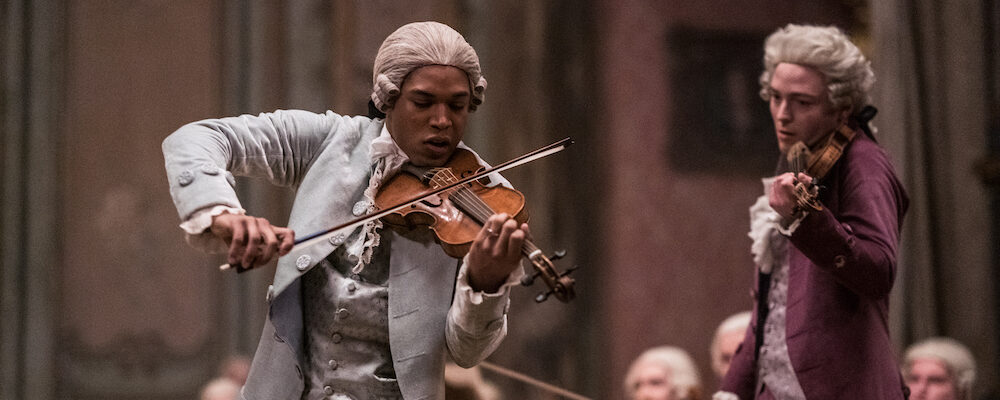‘Chevalier’ Tells the Extraordinary Story of Black Virtuoso in Marie Antoinette’s France
Sandra Miska
It is said that a note of music dies as soon as it hits a wall, and while one can see the works of Leonardo da Vinci up close to this day, no one alive could possibly know what it is like to see Mozart perform or hear the voice of an opera singer who lived before recording was possible. The nearly erased legacy of a biracial violinist and composer Joseph Bologne, Chevalier de Saint-Georges, a contemporary of Mozart’s, has been largely forgotten until recent years. Now, “Chevalier” takes audiences into his world, with Kelvin Harrison Jr. giving an impassioned performance as this extraordinary man caught between two worlds on the eve of the French Revolution.
Saint-Georges is introduced as being a man full of confidence, as the viewer first sees him interrupting a performance of Mozart’s (Joseph Prowen) to ask if he can play alongside him. Afterwards, he leaves the crowd stunned and a defeated Wolfgang in his dust. A flashback to his childhood show that this cocky young man was never expected to be the toast of Paris, as he was the illegitimate son of white plantation owner Georges de Bologne Saint-Georges (Jim Hight), and his Guadeloupean slave, Nanon (a terrific Ronke Adekoluejo). At the age of eight, Joseph is ripped away from his mother and sent to boarding school in France. George recognizes his son’s musical talent and convinces the headmaster to take the boy in. However, taking him out of Guadeloupe does not just separate Saint-Georges from Nanon, but also from one-half of his identity. Before he leaves, George tells his son that he has to be exceptional in order to prove himself to the white people around him. The harsh, racist treatment inflicted on him leads to his developing a thick skin, and he ends up succeeding beyond anyone’s expectations.
In addition to being a musical wunderkind, Saint-Georges also becomes a champion fencer, and after beating an opponent in front of Queen Marie Antoinette (Lucy Boynton), she makes him a Chevalier. He proceeds to not only become an ornament at her court, but also her confidante. He also finds himself in bed with numerous court ladies, although he turns down the advances of Marie-Madeleine Guimard (Minnie Driver), a fading opera star with a menacing vibe, a rejection that has consequences later on.
“Chevalier” gives Saint-Georges his due, features rousing musical scenes and beautiful costumes and sets, but, above all, this is a compelling story about identity. For most of the film, Saint-Georges finds himself in a no man’s land, as he leads the life of a gentleman, but still faces restrictions due to the color of his skin, and this includes whom he can, or rather cannot, marry. While composing an opera, he finds a kindred spirit in his lead, Marie-Josephine de Montalembert (Samara Weaving), an aristocratic woman stuck in a miserable marriage to a powerful blowhard, Marc René, marquis de Montalembert (Martin Csokas). The broad strokes of the love story between Saint-Georges and Marie-Josephine seem like something out of a paperback novel, but are almost entirely based on what actually happened.
Harrison is phenomenal as Saint-Georges, bringing a vulnerability to his performance, as well as a swagger and charm that made the Chevalier attractive to many, and threatening to some. Boyton also delivers a decent performance as an ill-fated queen who slowly becomes dour and unpopular as the story progresses, although the film imagines her as being more powerful than she probably was. Her husband, the ineffectual king, is a non-entity here.
Director Stephen Williams and screenwriter Stefani Robinson do an excellent job of pulling Saint-Georges in different directions. The arrival of Nanon in Paris following the death of George leads to some pivotal changes for him, and not just in his living situation. Nanon proves to be a stabilizing force in his life, and she opens his eyes to the thriving Black culture in France, which comes to influence his music. It is also she who gives him strength when dark forces close in on him, and he has to choose between upholding the status quo or being a part of the French Revolution. All of this leads to a stunning curtain call.
“Chevalier” releases April 21 in theaters nationwide.

